Biography
Descended from the nobility of the Estland Governorate.
Marine service
He graduated from the course in the Naval Cadet Corps in December 1841 and was promoted to warrant officer with an appointment to the 25th naval crew, but then left to attend the course in the officer classes of the naval corps. At the end of the course until March 1846 he was in the carriage, and in March, due to illness, he was dismissed with the rank of lieutenant.
Army service
The naval service did not appeal to the young officer - and the same 1846, in September, finds him already an ensign of the Tenginsky infantry regiment with the appointment of an adjutant to the former chief of the main headquarters of the Caucasian army, Adjutant General Kotzebue.
Already in January 1847 he took part in an expedition to the Galashevsky Gorge, in the detachment of Major General Nesterov. The same year was followed by the production of second lieutenant and then in lieutenant (June), for the difference in business during the actions in Dagestan of the main detachment of the Caucasian governor, Adjutant General Prince Vorontsov.
In 1848 he took part in the hostilities of the Dagestan detachment of the adjutant general of Prince Argutinsky and was awarded the Order of St. Anna 4th degree with the inscription "For Bravery" and St. Anna 3rd degree with a bow. The next year gave the opportunity to distinguish himself twice: when the village of Chokh was captured and when Shamil's troops were scattered; for these two cases he was promoted to staff captain.
In 1850, he took an active part in the construction of the Kurinsky fortification (in the detachment of Major General Kozlovsky), the camp and felling of wood on the Kachkalykovsky heights, for which he was promoted to captain.
In 1851, for new differences in business with the highlanders at p. Belaya, in the detachment of Lieutenant General Zavadovsky, received major epaulettes and was enlisted in the army. The next year passed quietly, but already in 1853 he found himself on the left flank of the Caucasian line and in the detachment of Lieutenant General Prince Baryatinsky participated in an expedition to the Galashevskoe gorge and in battles with Shamil.
For the distinction rendered in these matters, he is promoted to lieutenant colonel and, by order of the commander-in-chief of the Caucasian army, is attached to the Jaeger General-Field Marshal of the Prince of Warsaw Count Paskevich of the Erivan regiment.
The beginning of the Eastern War in 1853 found him adjutant to the chief of staff of the 4th and 5th corps on the Danube, Adjutant General P. Kotzebue, and for his activities during the siege of Silistria, he was awarded the Order of St. Vladimir of the 4th degree with a bow and a gold half-saber with the inscription "For Bravery".
In February 1855, he was appointed commander of the Orlovsky jaeger regiment of Count Paskevich of the Erivan regiment, but, not yet leaving for the place of new service, he was appointed commander of the then Vitebsk reserve jaeger regiment, which was being formed then, with production, on August 30, for distinction, to colonel.
Polish uprising of 1863
From 1857 he commanded the Narva infantry regiment, and in 1863, for his distinction in suppressing the Polish rebellion, he was promoted to major general with the appointment to be at the disposal of the commander of the Warsaw Military District. Then, in 1864, he was assigned for special assignments at the headquarters of the Odessa Military District, and in 1867 he was at the 1st Guards Infantry Division and in February of the same year was appointed commander of the 11th Infantry Division, and then, in 1869 year, commander of the 26th Infantry Division. In 1871 he was promoted to lieutenant general.
Russian-Turkish War (1877-1878)
On the Russian-Turkish war of 1877–1878. went at the head of the 26th Infantry Division, which, after crossing the Danube, entered the detachment of the heir to the Tsarevich (the future Emperor Alexander III), where he successively commanded the Koprovitsky, Chairkioisky and Tarnovsky detachments, and successfully repelled the attacks of the Turks. Being the commander of the 11th Infantry Corps, located on the southern part of the vast front, occupied by the Ruschuk detachment of the heir to the crown prince, he had to take on the blow of Suleiman Pasha, aimed at Elena and Tarnovo. The lack of proper energy in the actions of the Turks and the persistent energy shown by them in collecting reinforcements helped the Russian troops to safely get out of an extremely difficult situation.
In January 1878, he commanded the left side detachment (12 battalions, 8 squadrons, 38 guns), which was to cross the Balkans at Tvarditsa, which was done without a fight, but with the greatest difficulties of movement along the icy mountain steeps. After crossing the Balkans and occupying Adrianople, he was appointed commander of the 9th Army Corps and Adrianople Governor General. For military distinction in 1877–1878, Dellingshausen was awarded the Order of the White Eagle with swords and gold, decorated with diamonds, sword with the inscription "For Bravery."
Resignation in the rank of general from infantry
In August 1878 he was appointed commander of the 3rd Army Corps, and in July 1882 - the commander of the 14th Army Corps.
In October 1885 he was promoted to general from infantry with dismissal from service.
He died in 1888 on his estate in Estland.
| Military offices |
|---|
| Preceded by | Commander of the 26th Infantry Division
1869-1878 | Succeeded by |

Arshak Ter-Gukasov was a Lieutenant-General of the Russian Empire. Born to an Armenian family in Tiflis, he started his military career in 1850 and was subsequently involved in the war in the Caucasus. After being promoted to the rank of lieutenant general, and serving various governmental posts, he was then assigned as the Yerevan Forces commander of Russia's army during the Russo-Turkish War of 1877–1878. Owing to his successes in battle, Arshak Ter-Gukasov was awarded medals by Imperial Russia and other foreign powers.
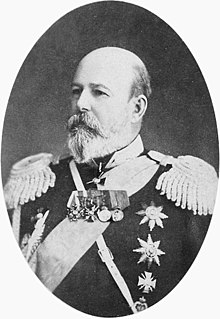
Prince Grigory Sergeyevich Golitsyn was a Russian general and statesman from the princely Golitsyn family.

Baron Anton Yegorovich Zaltsa, better known as Baron Anton Yegorovich von Saltza, was a Russian general of Baltic German origin who was the commander of the Kazan Military District, he was also one of the commanders of the Russian Army during the early stages of First World War.
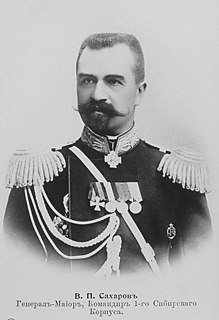
Vladimir Viktorovich Sakharov was a Russian general of the cavalry who served in the Russian Imperial Army. In an army career lasting from 1869 to 1917, he served in the Russo-Turkish War of 1877-1878, the Russo-Japanese War, and World War I.

General Pavel Petrovich Liprandi was a Russian military officer of Spanish-Italian descent who participated in the Crimean War.

Pyotr Semyonovich Vannovsky was a Russian statesman and military leader of Belarusian extraction, who served in the Imperial Russian Army. He was also an honorary member of the Academy of Military Medical, the Mikhailovsky Artillery School, the Mykolaiv Engineering School, the Imperial Academy of Sciences, and a full knight of the Order of St. Vladimir.
Louis Ernst Freiherr von Nicolay was a Russian general during the Caucasian War. He converted to the Roman Catholicism taking a name Jean-Louis in the monastic life of the Carthusians.

Fedor Sergeyevich Panyutin was a Russian general, Warsaw military governor, and member of the State Council.

Mitrofan Petrovich Tchaikovsky was an infantry general, commandant of the Ivangorod fortress, commander of the 3rd Army Corps.
Aleksey Domantovich - cavalry general, commander of the Persian Cossack Brigade.

Vladimir Alekseyevich Alftan - Russian military leader, lieutenant general of the Russian Imperial Army. Military orientalist, researcher of Korea.
Nikolai Fyodorovich Engelhardt was a Russian lieutenant general who helped to suppress the Hungarian Revolution of 1848.
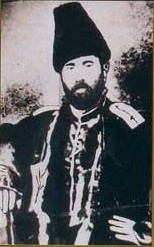
Ismail Khan Ehsan Khan oghlu Nakhchivanski was a Azerbaijani Cavalry General in Imperial Russian Army. He was the son of Ehsan Khan Nakhichevansky and uncle of Huseyn Khan Nakhchivanski. His brother Kelbali Khan Nakhchivanski was also Cavalry General in the Russian Imperial Army.

Kelbali Khan Ehsan Khan oghlu Nakhchivanski - was an Azerbaijani Cavalry General in the Imperial Russian Army. Father of the Adjutant General, General of Cavalry Huseyn Khan Nakhchivanski and brother of the General of the Cavalry Ismail Khan Nakhchivanski. His father Ehsan Khan Nakhichevansky, later known by his Russified name of Ehsan Khan Nakhichevansky was the last ruler of the Nakhichevan Khanate.
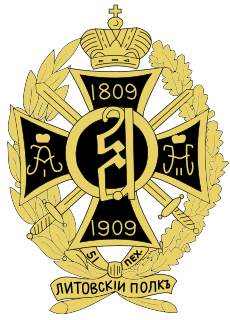
The 51st Lithuanian Infantry Regiment, known as the 51st Lithuanian Infantry Regiment of His Imperial Highness Heir to the Tsarevich from 1904, was an infantry regiment that served in the Imperial Russian Army.

Vasily Aleksandrovich Geyman was a Russian Lieutenant General who was notable for his participation in the Caucasian War and the Russo-Turkish War.

Otton Egorovich Rauch was a Russian Lieutenant general was most notable for his participation in the Russo-Turkish War.
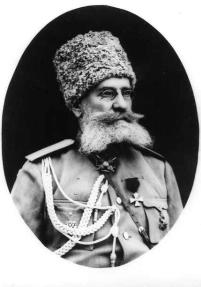
Georgy Eduardovich Bergmann was a Russian General of the Infantry who was known for organizing the Bergmann Offensive against the Ottoman Empire during the First World War. He was also a commander of the White Army during the Russian Civil War.
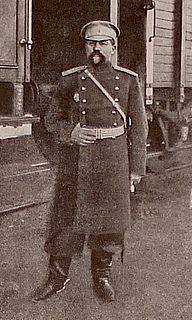
Nikolai Mikhailovich Istomin was a Russian Lieutenant General who was known for being the commander of the 5th Caucasian Army Corps during World War I.

Pyotr Ivanovich Oganovsky was a Russian general of the infantry who participated in the Russo-Turkish War, Russo-Japanese War and the First World War. He was also a writer.
This page is based on this
Wikipedia article Text is available under the
CC BY-SA 4.0 license; additional terms may apply.
Images, videos and audio are available under their respective licenses.
















